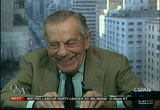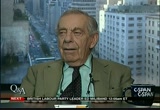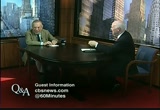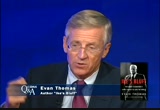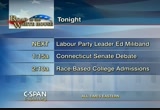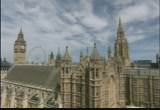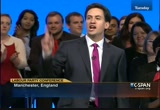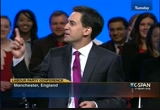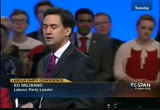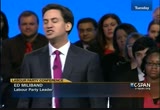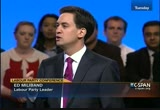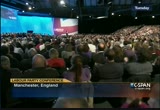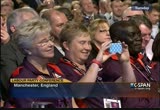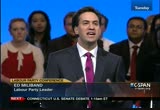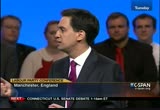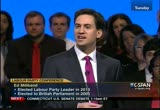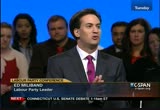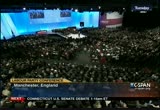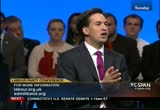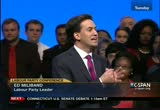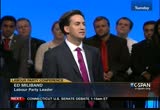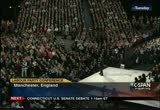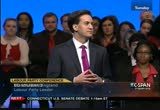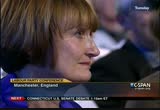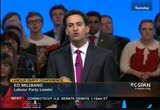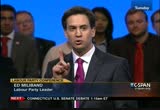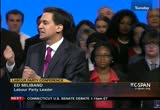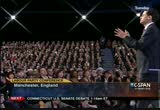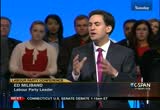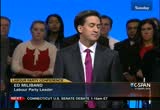tv P.M. Question Time CSPAN October 8, 2012 12:00am-12:30am EDT
12:00 am
two. what happened? >> you know what happens. that is something i have been thinking about a lot, and what keeps me from doing at, i have been asked i cannot tell you how many times to write a memoir, which i have no interest in. there are one or two subjects i would like to expand on, but i think what people do not quite understand is the physical strain of writing a book. it is hard work. it is hard, physical work. there is something about a book
12:01 am
that you really want to make it the best it can possibly be. there is extra pressure, something about the permanence. your name is on the spine and you want to be proud of it at all times. >> we are past time. we're out of time. thank you so much for spending an hour. >> it is always such a pleasure to talk to you. [captioning performed by national captioning institute] [captions copyright national cable satellite corp. 2012]
12:02 am
>> to give us your comments about this program, visit us at qanda.org. >> and the councils of the government and we must guard against an party influence, whether sought or unsought in military-industrial conflicts. >> why was that speech so important? >> it warned against that, which has become a cliche. and spent much of his presidency making sure the
12:03 am
military did not get out of hand. he kept military spending steady. that is very hard to do in the 1950's. we were creating a nuclear arsenal. he counted his own service, the army. he really cut it. military spending in the 1950's was 70% of the federal budget. >> next sunday on q&a. evan thoms. as >> next, remarks i the british labor party leader.
12:04 am
then a discussion about race as a qualifier for college admission. >> i watched the various congressional hearings and deliberations on public policy and information that is put out by the various think tanks and washington d.c. i like sundays at 8:00 or they talk to different authors and discuss the books they have not risen. it is a great way to get information. >> wesley romans watches c-span on comcast. but you as a public service by your television provider. the british house of commons is in recess. prime minister's questions will
12:05 am
12:06 am
special memories for me because two years ago i was elected the leader of this party. i'm older. i feel a lot older actually. [laughter] i hope i'm a bit wiser. but i am prouder than ever to be the leader of the labour party. [applause] you may have noticed that doing this job you get called some names, some of the nice, some of them not so nice. let me tell you my favorite -- it was when mitt romney came to britain and called me "mr. leader." i don't know about you but i think it has a certain ring to it myself, it's sort of half- way to north korea. mitt, thanks a lot for that.
12:07 am
let me tell you a bit of insight in to conference. i always look forward to conference. but the leader's speech, as previous leaders will attest, can be a bit of a trial. you get all kinds of advice from people. say this, don't say that. smile here, don't smile there. stand there, don't stand there. thanks tony, gordon and neil for that. but sometimes you get a bit fed up with it as the leader. and so the other day, and this is an absolutely true story, i decided that to get away from it all, the speechwriting, all of that, i'd go for a walk with my three year old son, daniel. it was an absolutely gorgeous late summer day. so we went out, i wanted to go to the park. here's the first thing he said to me, "daddy, i can help you with your speech." i was, like, not you as well.
12:08 am
he is a miliband after all. and he said to me, "daddy, you can't do it on your own." this is absolutely true, and i said "well that's a good labour insight, you can't do it all your own. daniel, what do you want in my speech? he said, "i want dinosaurs. i want dinosaurs, i want flying dinosaurs. i want dinosaurs that eat people, daddy." i said, no, daniel. we tried predators last year. [applause] ok, look only one problem, where's my speech? i want to do something different today. i want to tell you my story. i want to tell you who i am. what i believe. and why i have a deep conviction that together we can change this country.
12:09 am
my conviction is rooted in my family's story, a story that starts 1,000 miles from here, because the milibands haven't sat under the same oak tree for the last 500 years. both of my parents came to britain as immigrants, jewish refugees from the nazis. i know i would not be standing on this stage today without the compassion and tolerance of our great country. great britain. [applause] and you know my parents saw britain rebuilt after the second world war. i was born in my local nhs hospital, the same hospital my two sons would later be born in. as you saw in the film, i went to my local school.
12:10 am
i went to my local comprehensive with people from all backgrounds. i still remember the amazing and inspiring teaching i got at that school, and one of my teachers, my english teacher, chris dunne, is here with us today. thank you, chris, and to all the teachers at haverstock. [applause] it was a really tough school, but order was kept by one of the scariest headmistress you could possibly imagine, mrs. jenkins. and you know what? i learned at my school about a lot more than how to pass exams. i learned how to get on with people from all backgrounds, whoever they were. i wouldn't be standing on this stage today without my comprehensive school education. [applause]
12:11 am
so, britain gave me, gave my family, a great gift that my parents never had. a safe and secure childhood. and you know my parents didn't talk much about their early lives, it was too painful, it hurt too much. the pain of those they lost. the guilt of survivors. but i believe that their experience meant they brought up both david and myself differently as a result. because having struggled for life itself, they instilled in us a sense of duty to ease the struggles of others. and this came not just from my parents' wartime experience it came from the daily fabric of our childhood. you know there were toys and games, rows about homework. i was actually a dallas fan, believe it or not, which didn't go down well with my dad as you can imagine. so of course there were the
12:12 am
normal things, but every upbringing is special, and mine was special because of the place of politics within it. when i was twelve years old, i met a south african friend of my parents, her name was ruth first. the image i remember is of somebody vivacious, full of life, full of laughter. and then i remember a few months later coming down to breakfast and seeing my mum in tears because ruth first had been murdered by a letter bomb from the south african secret police. murdered for being part of the anti-apartheid movement. now i didn't understand the ins and outs of it, but i was shocked. i was angry i knew that wasn't the way the world was meant to be. i knew i had a duty to do something about it. it is this upbringing that has made me who i am. a person of faith, not a
12:13 am
religious faith but a faith nonetheless. a faith, i believe, many religious people would recognize. so here is my faith. i believe we have a duty to leave the world a better pl ace than we found it. i believe we cannot shrug our -- [applause] -- shoulders at injustice, and just say that's the way the world is. and i believe that we can overcome any odds if we come together as people. that's how my mum survived the war. the kindness of strangers. nuns in a convent who took her in and sheltered her from the nazis, took in a jewish girl at risk to themselves.
12:14 am
it's what my dad found when he came to these shores and joined the royal navy and was part of britain winning the war. now of course my parents didn't tell me what career to go into. my late father, as some of you know, wouldn't agree with many of the things i stand for. he would've loved the idea of red ed. [laughter] but he would have been a little bit disappointed that it isn't true. my mum probably doesn't agree with me either, but like most mums is too kind to say so. and look when i was younger i wasn't certain i wanted to be a politician. but i do believe the best way me for to give back to britain, the best way to be true to my faith, is through politics. now that is not a fashionable view today.
12:15 am
because millions of people have given up on politics, they think we're all the same. well i guess you could say i am out to prove them wrong. that is who i am. [applause] that is what i believe. that is my faith. and i know who i need to serve in britain with my faith. it's the people i've met on my journey as leader of the opposition. the people who come up to me on trains, in the street, in shops who ask me about what the labour party is going to do for them and tell me the stories of their lives. it's for them, the people i have met on my journey as leader of the opposition that today's speech is for.
12:16 am
you know i think of the young woman i met at a youth centre in london earlier this year. she was imming with hopes and ambitions for the future. she was full of life. she was full of desire to get on and do the best for herself. and then she told me her story. she'd sent off her cv to 137 employers and she'd not had a reply from any of them. many of you in this audience will know people in the same position. just think how that crushes the hopes of a generation. i want to talk to her, to a whole generation of young people who feel that britain under this government is no t offering them a future. [applause] i think back to the small
12:17 am
businessman i met in july. a proud man called alan henderson, a small businessman. let me tell you alan henderson's story. he'd spent 40 years building up his sign making business, 40 years. he told me his story, he went to see his bank manager in 1972 at his local high street bank, he got a loan and he started his business. but something terrible happened to alan henderson and his family a few years back. he was ripped off by the bank he had been with all that time and alan henderson and his family have been living through a nightmare ever since. i want to talk to him, and all the people of britain who feel they're at the mercy of forces beyond their control. [applause] i want to talk to all of the people of this country who always thought of themselves as comfortably off, but who now
12:18 am
find themselves struggling to make ends meet. they ask: why is it that when oil prices go up, the petrol price goes up. but when the oil price comes down, the petrol price just stays the same? they ask -- why is it that the gas and electricity bills just go up and up and up? and they ask -- why is it that the privatized train companies can make hundreds of millions of pounds in profit at the same time as train fares are going up by 10% a year? [applause] they think the system just doesn't work for them. and you know what? they're right. it doesn't. it doesn't work for them but for the cozy cartels and powerful interests that government hasn't cut down to size.
12:19 am
i want to talk to them and all the millions of people across our country who don't think they get a fair crack of the whip. and i want to say to them, yes our problems are deep. but they can be overcome. deep problems about who britain is run for and who prospers within it. one rule for those at the top, another rule for everybody else. two nations, not one. i want to say to them today it's not the britain you believe in. it's not the britain i believe in. it's not the britain this party will ever be satisfied with. [applause] so friends we're going to change it. and here's how. my faith that we can, starts
12:20 am
with the inner strength of us as a country. you see the problem isn't the british people, just think about the olympics and paralympic games. it was a triumph for britain. [applause] and why did we succeed? we succeeded because of our outstanding athletes from, zara phillips the grand-daughter of a parachuting queen, to a boy born in somalia, called mo farah. mo farah. a true brit. and a true hero for our country. [applause] we succeeded because of the outstanding volunteers, the games makers who are here with us today, all 70,000 games makers.
12:21 am
[applause] they put a mirror up to britain and showed us the best of ourselves. we succeeded because of our outstanding troops, our outstanding troops, many of whom were drafted in at the last minute. and let us today pay tribute to their bravery, their courage, their sacrifice in afghanistan and all round the world. [applause] and let's say to them, and let's say to them, just as you do our duty by us in the most courageous way possible so we will always do our duty by you, both in military and in civilian life. [applause]
12:22 am
we succeeded because of our outstanding police and let us in this city of manchester show our appreciation for what the extraordinary police men and women of our country do for our country. and we succeeded and this is a real lesson, we succeeded because of a group of individuals, a group of individuals who saw the odds against london's bid and thought, never mind the odds, we are going to fight for the bid for london, we are going to win the bid for london, from seb coe to our very own dame tessa jowell.
12:23 am
[applause] and you know what friends, we succeeded, because of one reason more than any other, we succeeded because of us. we succeeded because of us, us the british people, us the british people who welcomed the athletes from abroad, who cheered them on. who found ourselves talking to each other each morning about what had happened at the olympics the night before, in a way that we hadn't talked to each other before. we succeeded because we came together as a country we worked together as a country. we joined together as a country. that's why we achieved more than we imagined possible. you know, i'll just tell you this. i can't remember a time like it in the whole history of my
12:24 am
lifetime. i can't remember a time like it, that sense of a country united, that sense of a country that felt it was together. that is the spirit this labour party believes in. [applause] but i may not remember that spirit, but that spirit has echoed through british history. you know, 140 years ago, 140 years ago to the year. another leader of the opposition gave a speech. it was in the free trade hall that used to stand opposite this building. it's the radisson now by the way. his name was benjamin disraeli. he was a tory. but don't let that but you off,
12:25 am
just for a minute. his speech took over three hours to deliver, don't' worry, don't worry, and he drank two whole bottles of brandy while delivering it. that is absolutely true. now look, i just want to say, i know a speech that long would probably kill you. and the brandy would definitely kill me. but let us remember what disraeli was celebrated for. it was a vision of britain. a vision of a britain where patriotism, loyalty, dedication to the common cause courses through the veins of all and nobody feels left out. it was a vision of britain coming together to overcome the challenges we faced. disraeli called it "one nation". "one nation." we heard the phrase again as the country came together to defeat fascism. and we heard it again as clement attlee's labour
12:26 am
government rebuilt britain after the war. [applause] friends, i didn't become leader of the labour party to reinvent the world of disraeli or attlee. but i do believe in that spirit. that spirit of one nation. one nation -- a country where everyone has a stake. one nation -- a country where prosperity is fairly shared. one nation: where we have a shared destiny, a sense of shared endeavor and a common life that we lead together. that is my vision of one nation. that is my vision of britain. that is the britain we must become. [applause]
12:27 am
and here is the genius of one nation. it doesn't just tell us the country we can be. it tells us how we must rebuild. we won the war because we were one nation. we built the peace because labour government's and conservative, governments understood we needed to be one nation. every time britain has faced its gravest challenge, we have only come through the storm because we were one nation. but too often governments have forgotten that lesson. with one million young people out of work, we just can't succeed as a country. with the gap between rich and poor growing wider and wider, we just can't succeed as a country. with millions of people feeling that hard work and effort are not rewarded, we just can't succeed as a country. and with so many people having
12:28 am
been told for so long that the only way to get on is to be on your own, in it for yourself, we just can't succeed as a country. [applause] yes friends, to come through the storm, to overcome the challenges we face, we must rediscover that spirit. that spirit the british people never forgot. that spirit of one nation. one nation. a country where everyone plays their part. a country we rebuild together. [applause] so here is the big question of today. who can make us one nation? who can bring britain together?
12:29 am
what about the tories? what about the tories? i didn't hear you, what about the tories? let me explain why, let me explain why. i want to talk very directly to those who voted for david cameron at the last general election. i understand why you voted for him. i understand why you turned away from the last labour government. this government took power in difficult economic times. it was a country still coming to terms with the financial crisis. a financial crisis that has afflicted every country round the world. i understand why you were willing to give david cameron the benefit of the doubt. but i think we've had long enough to make a judgment. long enough to make a judgment because they turned a recovery into the
68 Views
IN COLLECTIONS
CSPAN Television Archive
Television Archive  Television Archive News Search Service
Television Archive News Search Service 
Uploaded by TV Archive on

 Live Music Archive
Live Music Archive Librivox Free Audio
Librivox Free Audio Metropolitan Museum
Metropolitan Museum Cleveland Museum of Art
Cleveland Museum of Art Internet Arcade
Internet Arcade Console Living Room
Console Living Room Books to Borrow
Books to Borrow Open Library
Open Library TV News
TV News Understanding 9/11
Understanding 9/11